|
|
|
Sort Order |
|
|
|
Items / Page
|
|
|
|
|
|
|
| Srl | Item |
| 1 |
ID:
158362
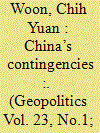

|
|
|
|
|
| Summary/Abstract |
This paper examines the intimate relationship between narratives emanating from China and their uses of Chinese history, and how such perspectives inform China’s geopolitical positioning and practices in lieu of its purported ‘rise’. Taking inspiration from the deconstructive impetus of critical geopolitics, this article contends that these historical claims to China’s rise constitute deterministic accounts, hinging on the notion of Chinese exceptionalism to provide discursive backing for a Sinocentric geopolitical order in the coming decades. This in turn downplays ‘alternative’ historiographies that can shed light on how the nature of China’s emergence may be more dependent on and shaped by the external environment than previously acknowledged. Building on the historical-geographical expositions related to the idea of contingency, this article demonstrates how China (whether it be in the past or present) cannot be seen as operating in a vacuum but has to constantly negotiate and adjust its strategy of engagements/interactions based on the specific demands imposed by world politics. Specifically, by elucidating these dimensions through cross-strait relations between China and Taiwan, it is argued that understanding China’s contingencies can raise important questions for us to critically appreciate the contextual actors, processes and relationships that differentially impact on China’s engagements in the world.
|
|
|
|
|
|
|
|
|
|
|
|
|
|
|
|
| 2 |
ID:
121436
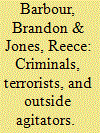

|
|
|
|
|
| Publication |
2013.
|
| Summary/Abstract |
This article is a critical geopolitical analysis of Chinese media representations of the 5 July 2009 riots in Xinjiang, China. Significant events often define the geopolitical climate by creating a space for the construction of boundaries between identity categories and the appropriate norms for behaviour towards the Other. The post-riot reports framed the event through the prism of the global war on terror to justify a violent response to protect Chinese citizens from the perceived threat of the Other. After connecting theories of narratives, the event, and group making, the article identifies three representational tropes - the criminal, the terrorist, and the outside agitator - in Chinese documents that create boundaries between the identity categories Uyghur and Han and define how the Other should be treated. The three representation tropes of the Other in the aftermath of the 5 July riots simultaneously situate the protestors as outside Chinese society and perpetuate the claim of the superiority of Chinese culture and civilisation.
|
|
|
|
|
|
|
|
|
|
|
|
|
|
|
|
| 3 |
ID:
071312
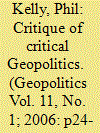

|
|
|
| 4 |
ID:
115036
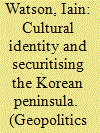

|
|
|
|
|
| Publication |
2012.
|
| Summary/Abstract |
The paper discusses South Korea's 'brand Korea' initiative and the impact of cultural transformations on the South Korean national security narrative. The paper considers the practices of identity and security representation in South Korea and outlines how cultural transformations in a country which has built its national security on an assumption of racial and ethnic homogeneity are affecting relations between South and North Korea. The paper argues that these issues can be explored through a critical geopolitics perspective and that the key relationship resides in the narratives and representations of threat and 'the foreigner.' The paper discusses critical geopolitics within a non-Western context and explores how cultural transformations are creating new narratives and new representations of the relationship between foreigner, national identity and national security.
|
|
|
|
|
|
|
|
|
|
|
|
|
|
|
|
| 5 |
ID:
188472
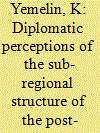

|
|
|
|
|
| Summary/Abstract |
IN CONTRAST to the rather clearly defined state borders, the division of the ecumene into regions and subregions is relative and highly speculative. It is implemented at the level of individuals and social groups, as well as states and political blocs. The classics of critical geopolitics, who insist on the socially conditioned basis of the perception of political and geographical space, argue that the drawing of boundaries may be both "conceptual and cartographic, imaginary and actual, social and aesthetic."
|
|
|
|
|
|
|
|
|
|
|
|
|
|
|
|
| 6 |
ID:
084635
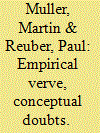

|
|
|
|
|
| Publication |
2008.
|
| Summary/Abstract |
When critical geopolitics entered German political geography, its empirical verve helped crank up a discipline which had diminished into an academic backwater. Soon, however, conceptual doubts began to supersede the initial enthusiasm with which critical geopolitics had been welcomed into political geography. Critical voices in German geography highlight the conceptual heterogeneity of critical geopolitics which engenders clashes between different, partly incommensurable epistemologies. Our paper traces the empirical and conceptual trajectory of critical geopolitics and the multifarious critique of it in German geography, before venturing to take a fresh look at poststructuralist, postcolonialist and systems theoretical approaches which, in the German context, are discussed as conceptual avenues that might usefully inform the further development of critical geopolitics.
|
|
|
|
|
|
|
|
|
|
|
|
|
|
|
|
| 7 |
ID:
164506
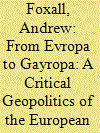

|
|
|
|
|
| Summary/Abstract |
The role of geopolitics in European Union (EU) foreign policy has been the focus of much media, political, and scholarly commentary. This literature has interrogated the topic from a number of perspectives, critically exploring, for example, the construction and embodiment of EU foreign policy, the geopolitics of regional cooperation within the EU, and the role of geopolitical imaginations in the creation of the EU. Far less literature, by contrast, has explored how the EU is viewed as a geopolitical actor by other entities. This paper begins to do this, by exploring how ideas of the EU have become an enduring geopolitical conception in post-Soviet Russia. It traces their evolution from the early 2000s, when Russia sought to emulate EU norms and values as part of a broader Westernising tendency in its foreign policy. Narratives about the EU were reworked in the context of the so-called ‘colour revolutions’ between 2003 and 2005, and have subsequently been revitalised since Vladimir Putin returned to the presidency in 2012. In these contexts, this paper critically scrutinises the evolution of the EU’s role within Russian practical geopolitical discourse and this role’s relations to other claims and visions of what it means for Russia to be a great power.
|
|
|
|
|
|
|
|
|
|
|
|
|
|
|
|
| 8 |
ID:
158356
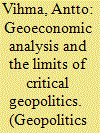

|
|
|
|
|
| Summary/Abstract |
There is a new wave of interest in the interplay between commerce and strategy, and ‘geoeconomics’ is again becoming a key concept in policy analysis. In the academia, however, since the emergence of the concept in the early 1990s, geoeconomic analysis has mostly been viewed through very critical lenses. Analysts have portrayed geoeconomics as simplified neorealism, as a neoliberal discourse, and as a securitisation project. This criticism of geoeconomics relies on an incomplete view of IR realism, as well as some oversimplifications of Luttwak, who introduced the term in 1990. This article underscores the relative property of Luttwak’s argument, in which economic means are gaining in importance in relation to military power, and countries are increasingly, but not always, turning to logic of conflict and geoeconomic policies. Luttwak also underscores the role of domestic politics and ideologies in determining whether a country engages in geoeconomic behaviour or not. The article suggests that strategic geoeconomic theory-building, inspired by but not limited to Luttwak, has much to contribute to our contemporary understanding of IR and geography, for example, in the analysis of strategy and the different power capabilities of states.
|
|
|
|
|
|
|
|
|
|
|
|
|
|
|
|
| 9 |
ID:
111708
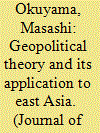

|
|
|
| 10 |
ID:
153745
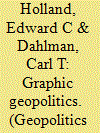

|
|
|
|
|
| Summary/Abstract |
Joe Sacco is best known for works that blend journalism with the format and structure of comic books. Sacco’s prior work has considered themes of political conflict, legacies of violence, and marginalization across a range of geographic contexts, including Bosnia, the Middle East, and the United States. This interview, conducted by the authors with Joe Sacco on 16 November 2015, explores these and other themes in an attempt to situate the positionality and choices of the creator of geopolitical narratives in the broader literature on critical geopolitics. We consider the themes of subject, representation, audience response, and stylistic influences, among others, in our conversation.
|
|
|
|
|
|
|
|
|
|
|
|
|
|
|
|
| 11 |
ID:
189393
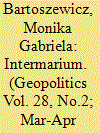

|
|
|
|
|
| Summary/Abstract |
The Three Seas Initiative was launched in 2015 by Croatia and Poland; today, it brings together 12 European states located in the Adriatic, Baltic, and Black Seas basins. To understand the rationale behind this seemingly precarious regional project, this paper employs the optics of critical geopolitics, which shifts the focus away from the exclusive concerns of great powers machinations, counters the dominant narrative by emphasising the multiplicity of voices in the geopolitical spectrum and stresses the emancipatory nature of the whole project balanced by its heterarchical characteristic. This angle allows us to capture the full complexity of this geopolitical design characterised by two phenomena: ‘being in between’ (monolithic powers, areas of domination, or at least domination, one religion and one language) and ‘fragmentation and multinationality’. The analysis demonstrates that Intermarium is an attempt to break away from everything that prevents the region ‘between Berlin and Moscow’ from being a subject, not an object of political affairs, and shows how Central and Eastern Europe fits into the post-liberal international order.
|
|
|
|
|
|
|
|
|
|
|
|
|
|
|
|
| 12 |
ID:
163806
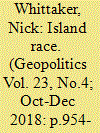

|
|
|
|
|
| Summary/Abstract |
What role do the historic identity tropes associated with being an island play in the foreign policy of contemporary Britain? To answer this underexplored question, this article utilises theories of critical geopolitics and ontological security to analyse a series of recent parliamentary debates and reveals the continuing importance of geopolitics to British foreign policy. This entails a conceptualisation of the role that discourses of island geopolitics played in the British Empire, giving rise to a set of tropes that I call island identity. Many studies emphasise the enduring pragmatism of British foreign policy; by contrast, my framework allows a foregrounding of how foreign policy-makers seek ontological security through the use of the established discursive tropes of island identity which establish Britain in subject positions of geopolitical relevance relative to novel contexts. The case studies focus in particular on globalisation and the EU –two issues of particular relevance, especially since the Brexit vote. This article allows a deeper understanding of both by contextualising them within British traditions of geopolitical discourse.
|
|
|
|
|
|
|
|
|
|
|
|
|
|
|
|
| 13 |
ID:
121433
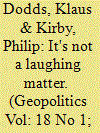

|
|
|
|
|
| Publication |
2013.
|
| Summary/Abstract |
This paper explores the possibilities of considering humour and laughter as a serious matter of concern for critical geopolitics and political geography more generally. While there has been some interest in this topic, there is scope to devise a more expansive research agenda. Using both laughter and Michael Billig's notion of unlaughter, the paper considers how these visceral expressions contribute, often in subtle ways, to the making of geopolitical subjectivities. The final part of the paper considers some possibilities for future research.
|
|
|
|
|
|
|
|
|
|
|
|
|
|
|
|
| 14 |
ID:
133902
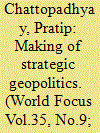

|
|
|
|
|
| Publication |
2014.
|
| Summary/Abstract |
Geopolitics as a subject has a trajectory from 'imperialist geopolitics' to 'new geopolitics' to 'critical geopolitics'. Contextualising Indo-Bangladesh relations since the post cold war period , particularly with the sensiticity of 'Gujral Doctrine' of 1996 within this 'geopolitical tradition', the paper shows that following Gujral, the NDA and UPA government have tried to project its benevolent image in its policy to Bangladesh, mostly in an one-way flow of assistance and aid, but badly wanting an assurance of 'zero-tolerance' to anti-Indian terrorist training camps in Bangladesh's soil.
|
|
|
|
|
|
|
|
|
|
|
|
|
|
|
|
| 15 |
ID:
190815
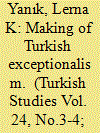

|
|
|
|
|
| Summary/Abstract |
This article has two main goals. The first is to examine the role of politics of space and time in making Turkey’s international relations. The second is to answer a more general question: what happens to a non-Western state like Turkey that cannot eliminate ‘differences’ that mark that state as non-Western? My answer is that these states handle these ‘differences’ that do not entirely disappear by creating exceptionalism. Exceptionalism rebrands ‘difference’ as ‘distinctiveness’ that can only be possessed by a specific country or nation. The article identifies two main pathways to the creation of Turkish exceptionalism, space and time, and explores the brief history of these spatio-temporal imaginations leading to the making of the exceptionalist narrative and their implications for Turkey’s foreign relations and identity.
|
|
|
|
|
|
|
|
|
|
|
|
|
|
|
|
| 16 |
ID:
103749
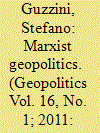

|
|
|
| 17 |
ID:
124777
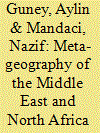

|
|
|
|
|
| Publication |
2013.
|
| Summary/Abstract |
This article critically analyses Turkish security discourses connected to the meta-geography of the Broader Middle East and North Africa (BMENA) before and after the developments of the Arab Spring. A critical geopolitics approach and critical security theories in international relations provide the theoretical framework, as security discourses are considered to be a product of geopolitical imaginations and codes that, in turn, shape the making of foreign and security policies. First, the article examines the invention of BMENA as a meta-geography within Turkey's new geopolitical imagination, as well as the new geopolitical codes underlying the new security discourses. Then, the article assesses the impact of the Arab Spring, which led to major changes in Turkey's newly established geopolitical codes, formulated in the pre-Arab Spring period, and analyses the ruptures and continuities in Turkey's security discourses in the light of those developments. Finally, the article concludes that the Arab Spring, especially the Syrian crisis, shifted the focus of Turkey's foreign policy in BMENA from cooperation to conflict. This has led to a resecuritization of Turkey's geopolitical codes, discourses and security practices in the region, revealing the limitation of Turkey's current geopolitical imagination.
|
|
|
|
|
|
|
|
|
|
|
|
|
|
|
|
| 18 |
ID:
084638
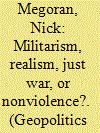

|
|
|
|
|
| Publication |
2008.
|
| Summary/Abstract |
Despite illuminating multiple modalities by which armed conflict is discursively justified, critical geopolitics can be criticised for providing a weak normative engagement with the social institution and practices of warfare. This has limited the impact of this school of thought outside of geography and critical security studies at a time when the ethics of military intervention have been prominent in public debate. This article explores the moral discourse of critical geopolitics through an examination of Gerard Toal's writings on Iraq and Bosnia. This scholarship is reviewed in the light of Coates's typology of major traditions of moral reflection on war - militarism, realism, just war theory, and pacifism/nonviolence. This analysis interrogates Toal's narratives, in which American military intervention was advocated in the Former Yugoslavia and opposed in Iraq. This suggests that rather than a thoroughgoing commitment to pacifism/nonviolence, or a blanket cynicism about American foreign policy, Toal's thinking includes an underlying attachment to some form of just war reasoning. However, its implicit and partial appropriation leads to a certain incoherence and selectivity that calls for further reflection. This presents a challenge to critical geopolitics. If it chooses to engage more explicitly with just war theory, its insights into identity and militarism could in turn inform a reworking of aspects of the theory, thereby facilitating critical geopolitics' engagement with wider public anti-militaristic modes of discourse. However, as this risks blunting the political potential of the project and repeating the mistakes of twentieth-century geopolitical thought, the paper concludes with a call for a wholehearted commitment to nonviolence.
|
|
|
|
|
|
|
|
|
|
|
|
|
|
|
|
| 19 |
ID:
192862
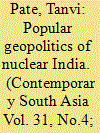

|
|
|
|
|
| Summary/Abstract |
Conventional wisdom on India’s nuclear geopolitics takes a top-down approach, foregrounding state perceptions of India’s nuclear role in regional and global politics. This conventional approach overlooks the bottom-up processes, such as media representations, which have been fundamental in shaping India’s nuclear identity. This is because media representations comprise common-sense knowledge, since media is the primary source of information in a democracy. Building on theoretical underpinnings of popular geopolitics, this article focuses on analyses of media representations in the Editorial of the English daily The Hindu from 2011–2020. This national newspaper boasts the second-largest readership among English dailies. The direct link between The Hindu Editorial’s representations of ‘nuclear India’ and India’s ‘regional’ and ‘global’ selfhood is crucial. The concerned period of 2011–2020 was pivotal in charting Indian geopolitical identity, as India partook in international negotiations after the US-India Nuclear Deal in 2008 and became a member of multilateral export control regimes like the Wassenaar Arrangement, Australia Group, and Missile Technology Control Regime. This article deconstructs the Editorial texts to elicit the intertextual links underpinning the ‘geopolitical cultural signifier’, ‘geospatial mythology’, and ‘self/other’ binary representation that operationalises India’s nuclear identity in regional and global settings.
|
|
|
|
|
|
|
|
|
|
|
|
|
|
|
|
| 20 |
ID:
139573
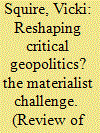

|
|
|
|
|
| Summary/Abstract |
How can the ‘materialist turn’ contribute to the reshaping of critical geopolitics? This article draws attention to the limits of an approach that emphasises the representational, cultural, and interpretive dimensions of geopolitics, while acknowledging the difficulties of an ontological shift to materiality for many scholars of critical geopolitics. It draws on the work of Karen Barad and Annemarie Mol in order to advance three arguments for the reshaping of critical geopolitics as a field of research. First, it argues for an approach to the analysis of power that examines materialdiscursive intra-actions and that cuts across various ontological, analytical, and disciplinary divides. Second, it argues for an analysis of boundary-production that focuses on the mutual enactment or co-constitution of subjects, objects, and environments rather than on performance. Third, it argues for an analytical approach that engages the terrain of geopolitics in terms of a multiplicity of ‘cuts’ that trouble simplifying geopolitical imaginations along with the clear-cut boundaries that these often imply. In so doing, the article makes the case for a more-than-human approach that does not overstate the efficacy of matter, but rather that engages processes of materialisation and dematerialisation without assuming materiality to be a determinant force.
|
|
|
|
|
|
|
|
|
|
|
|
|
|
|
|
|
|
|
|
|